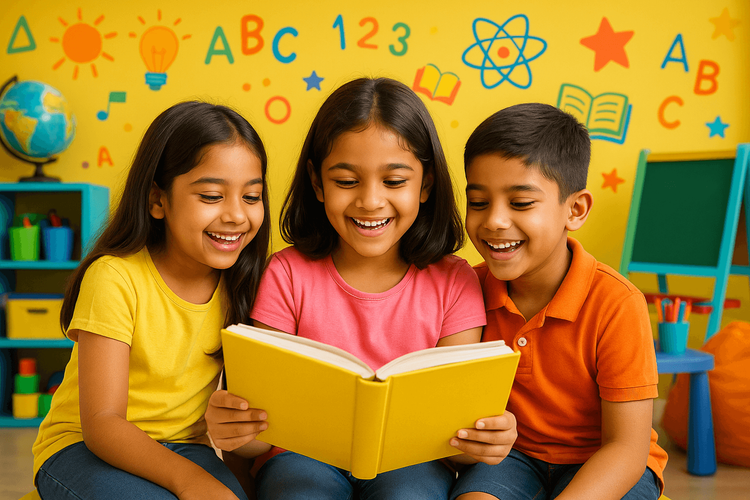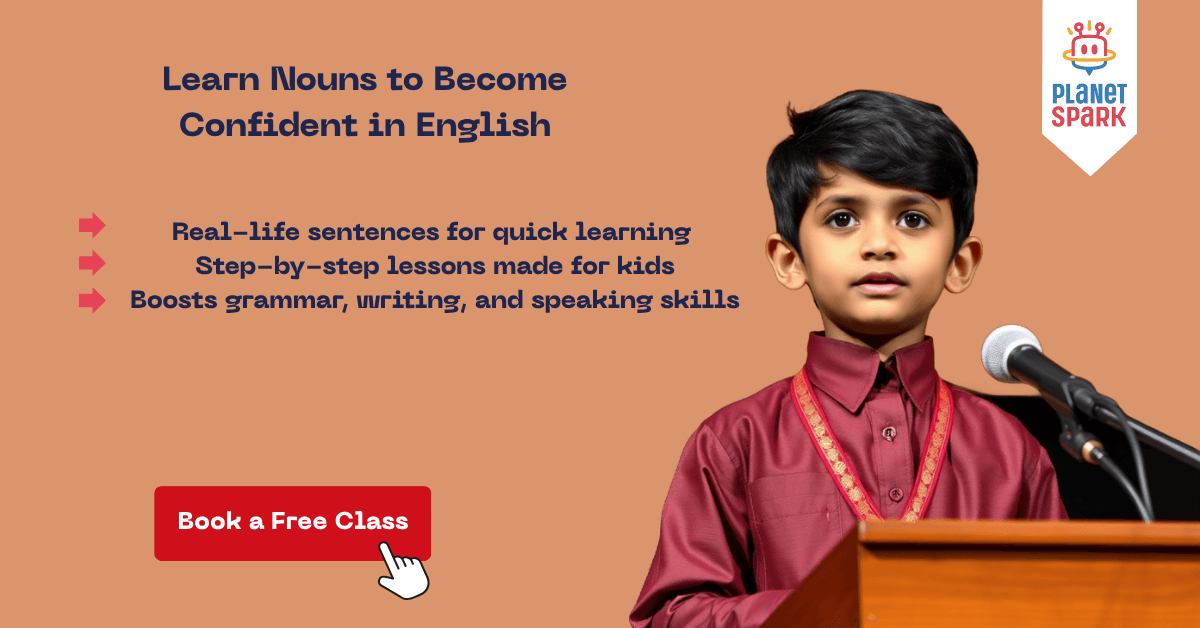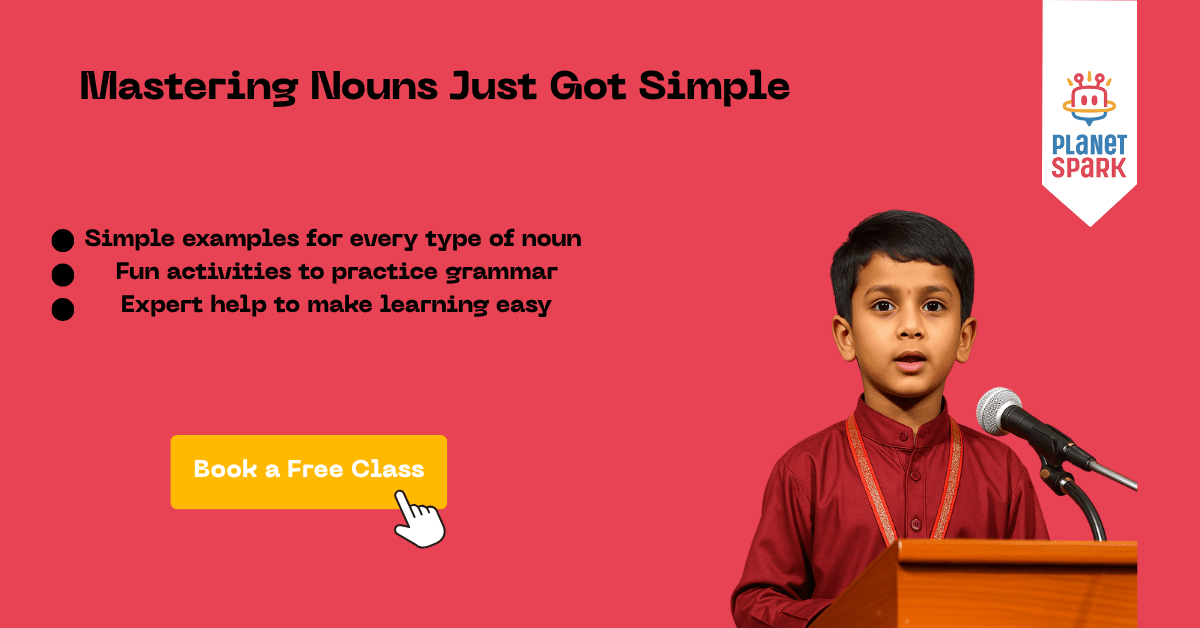How to Use Nouns with Easy Examples for Kids to Learn

Table of Contents
- What is a Noun?
- Types of Nouns with Examples
- 10 Examples of Noun Sentences
- Examples in Sentences
- Why Abstract Nouns Are Important
- Fun Games to Learn Nouns
- How PlanetSpark Helps with Understanding Nouns
- More About PlanetSpark's English Grammar Course
- Real-Life Use of Nouns in Everyday Conversations
- How to Help Children Write Their Own Sentences
- Turning Grammar into a Game Through Storytelling
- How Nouns Are Used in Everyday Life
- How to Assist Children to Write Their Own Sentence
- Simplifying Grammar with Storytelling
- Employing Visual Aids to Educate Nouns
- Conclusion
- FAQs
Learning noun basics is a first step to learning! Nouns are words that refer to people, places, animals, things, and even ideas! Through this entertaining yet simple blog, we will learn about noun examples in a sentence and teach you how to properly use them. We'll also cover the various types of nouns and provide 10 examples of noun sentences to turn learning into a fun experience.
Whether you are a student who wishes to enhance your grammar or a parent willing to assist your child's learning, this blog is full of useful tips, everyday examples in sentences, and engaging ways to enhance your language.
What is a Noun?
A noun is a word referring to a person, place, thing, or idea. Some easy-to-use examples of nouns are:
Person: teacher, boy, grandma
Place: school, park, India
Things: book, pencil, bicycle
Idea: happiness, strength, freedom
These are nouns and contribute greatly to the formation of meaningful sentences.
Let's examine some examples of nouns in sentences:
My teacher is really kind.
We visited the zoo yesterday.
She loves reading books.
Freedom matters to everyone.
The dog barked severely.
Types of Nouns with Examples
Nouns have different types. Let's understand each type with simple explanations and examples.
1. Proper Nouns
These are proper names of individuals, places, or objects.
Examples: Rahul, Mumbai, Eiffel Tower
Sentence: Rahul is my best friend.
2. Common Nouns
These are general names of people, places, or objects.
Examples: girl, city, car
Sentence: The girl is playing in the park.
3. Collective Nouns
These are names of a group of people, animals, or objects.
Examples: team, flock, bunch
Sentence: The team won the match.
4. Abstract Nouns
These are names of ideas, feelings, or qualities.
Examples: love, honesty, anger
Love can make the world a better place.
These are wonderful examples of abstract nouns in sentences that will help you grasp emotions and thoughts.
5. Concrete Nouns
They are things that you can see, touch, or feel.
Examples: apple, dog, chair
Sentence: I sat in the chair.
10 Examples of Noun Sentences
The following are 10 simple-to-grasp noun examples in sentences:
The boy is having ice cream.
India is a wonderful country.
She gave me a present.
My family had a picnic.
The river flows slowly.
Her joy was evident.
The players played diligently.
That ancient building is frightening.
Friendship is extremely special.
The lion is the jungle king.
These 10 examples of noun sentences are ideal for practice and gaining confidence.
Examples in Sentences
Let's have a glance at some more usual examples in sentences with various types of nouns:
The teacher wrote on the blackboard. (Common noun)
Mumbai is a metropolis. (Proper noun)
A group of birds passed overhead. (Collective noun)
Kindness is always welcome. (Abstract noun)
The apple is red and sweet. (Concrete noun)
These illustrate how nouns surround us everywhere.
Why Abstract Nouns Are Important
Abstract nouns assist us in describing ideas, emotions, and characteristics. They are nouns that we cannot touch or see but may feel or sense.
The following are some examples of abstract nouns in sentences:
Her honesty impressed everyone.
We felt joy.
It takes courage to tell the truth.
The use of such nouns makes writing and speaking more emotive and significant.
Fun Games to Learn Nouns
Learning nouns should be fun, we believe! Here are some activities we incorporate into our English Grammar Course:
Noun Hunt: Search for nouns in a paragraph.
Noun Matching: Match nouns to categories.
Create a Sentence: Construct your sentences with random nouns.
These games assist children in recognizing and applying nouns with ease.

How PlanetSpark Helps with Understanding Nouns
Our trained teachers walk children through each aspect of grammar. At the English Grammar Course by PlanetSpark, we provide:
Interactive games on nouns
Worksheets and quizzes
Grammar lessons based on stories
Live feedback
With our course, students seamlessly learn noun examples in sentences and feel confident using English.
More About PlanetSpark's English Grammar Course
PlanetSpark's English Grammar Course is created to make grammar simple, fun, and effective for children. Here's why this course is special:
1. Organized and Interactive Curriculum
The course is based on a well-planned curriculum that incorporates all major grammar concepts, such as nouns, verbs, adjectives, tenses, prepositions, and so on. Each idea is divided into bite-sized lessons that can easily be understood and remembered.
2. Live 1:1 Classes with Experienced Teachers
Kids learn more effectively when they receive one-on-one attention. That's why PlanetSpark provides live 1:1 classes with certified grammar teachers. The teachers assist children in learning at their own pace and give instant feedback to enhance their confidence.
3. Real-world learning with engaging worksheets and activities
Learning grammar doesn't have to be dry! Children like engaging activities like fill-in-the-blanks, sentence writing, and noun categorization games. All these hands-on activities enable them to remember grammar rules for the long haul.
4. Integration of Creative Writing
PlanetSpark also integrates grammar with creative writing. This enables children not just to learn rules but to implement them while writing their own essays and stories. It promotes creative thinking and solid sentence formation.
5. Ongoing Tests and Progress Monitoring
Parents are continuously updated about their child's development. Every module is wrapped up with tests to ensure children understand the subject well. This creates a solid foundation for language abilities.
6. Practical Applications
The course includes speaking and writing tasks that use real-life scenarios. Whether it’s writing a thank-you note, crafting a story using abstract nouns, or describing their day using 10 different nouns, kids learn how to use grammar in daily conversations.
Real-Life Use of Nouns in Everyday Conversations
Since we've learned about noun categories, noun examples in sentences, and even some fun activities - let's discuss how parents and children can apply nouns naturally to their daily life. Nouns are all around. Whether you're describing your favorite cartoon character or your school, you're employing nouns!
Have a go with your child: Ask your child to tell you about their lunch in as many nouns as they can.
Example: "My lunchbox contained a sandwich, a banana, and a bottle of juice."
See? You've just used three different everyday examples in sentences.
You can also say about feelings and ideas using abstract noun examples in sentences:
Example: "I felt pride when I won the medal at school."
The most effective way to reinforce learning of nouns is to incorporate it as a part of casual conversations. PlanetSpark makes real-life learning a part of each session by incorporating everyday conversations.
How to Help Children Write Their Own Sentences
Writing your own sentence makes you realize how grammar functions. At PlanetSpark, our grammar guides guide children to convert simple words into lovely sentences with the help of nouns.
Here's an easy formula that we use:
Noun + Verb + Object = Sentence
Examples:
The boy (noun) kicked (verb) the ball (object).
A girl (noun) drew (verb) a picture (object).
Practice making at least 3 new sentences daily using this formula. Begin with little and before long your child will be writing full paragraphs with ease! If you wonder how to add on this skill, PlanetSpark's English Grammar Course also integrates creative writing modules where kids learn to write poems, essays, and short stories- all with proper grammar.
Turning Grammar into a Game Through Storytelling
Children learn best when grammar is a game, not a lesson. That's why we integrate storytelling with grammar at PlanetSpark. For instance:
Think of a story that begins like this:
A fearless tiger named Tom resided in a serene jungle."
Now get your child to continue the narrative and add at least five additional nouns. This type of creative exercise presents 10 instances of noun sentences in an engaging, story-based format.
Not only does it make noun examples in sentences clearer, but it also enhances vocabulary, structure, and imagination. And yes- this approach works magic with unwilling learners too!

How Nouns Are Used in Everyday Life
Now that we've reviewed the types of nouns, noun examples in sentences, and even had some fun activities- let's discuss how children and parents can apply nouns instinctively in everyday life. Nouns are all around you. From naming your favorite TV cartoon character to discussing your school, you're applying nouns!
Try this with your child: Ask them to explain their lunch in as many nouns as possible.
Example: "My lunchbox contained a sandwich, a banana, and a bottle of juice."
See? You just employed three distinct everyday examples in sentences.
You may also explain emotions and ideas with abstract noun examples in sentences:
Example: "I felt pride when I won the medal at school."
The most effective way to reinforce learning of nouns is to integrate it into day-to-day conversations. PlanetSpark fosters learning in real life in every lesson.
How to Assist Children to Write Their Own Sentence
Writing your own sentence makes you aware of how grammar functions. Our mentors at PlanetSpark guide children to convert simple words into lovely sentences through the use of nouns.
Here's a straightforward formula that we use:
Noun + Verb + Object = Sentence
Examples:
The boy (noun) kicked (verb) the ball (object).
A girl (noun) drew (verb) a picture (object).
Practice creating at least 3 new sentences every day using this formula. Start small, and soon your child will be writing full paragraphs with confidence! If you are thinking how to extend this ability, PlanetSpark's English Grammar Course also interweaves creative writing modules where kids learn to pen poems, essays, and short stories- all following correct grammar.
Simplifying Grammar with Storytelling
Children learn most effectively when grammar is a game, not a lesson. So, at PlanetSpark, we combine storytelling and grammar. For instance:
Picture a story with the following opening sentence:
"A fearless tiger by the name of Tom dwelled in a serene jungle."
Now request your child to continue the story and add a minimum of five additional nouns.
This type of creative activity presents 10 examples of noun sentences in an enjoyable, story like setup. Not just does this facilitate comprehension of noun examples in sentences, but enhances vocabulary, sentence structure, and fantasy too. And yes- this approach proves magic with resistant learners as well!
Employing Visual Aids to Educate Nouns
Children are visual learners. That's why our instructors utilize pictures, flashcards, animations, and interactive slides throughout online classes. Here's an easy trick you can utilize at home:
Flash a picture in front of your child and ask:
"Can you identify five nouns within this image?"
Let us assume the picture is of a beach. Some of the possible responses could be:
Sand, umbrella, waves, children, sun.
This type of activity combines typical examples in sentences with actual-world visual learning. You can advance this game by introducing abstract nouns:
Happiness, peace, fun- the kind of feelings your child would experience at the beach.
Conclusion
Grammar learning through nouns need not be monotonous. The proper examples, games, and stories can help children learn grammar easily. Pay attention to noun examples in sentences, frequent examples in sentences, and examples of abstract nouns in sentences to develop robust language abilities.
PlanetSpark's English Grammar Course is ideal for children who wish to communicate and write in English with confidence. With experienced teachers, interactive classes, and hands-on activities, your child will never view grammar in the same light again. When children observe nouns in actual sentences, they learn them easily. Nouns help us communicate quickly about everything from individuals and locations to emotions and concepts. Nouns are easy to learn with regular practice, fun exercises, and simple examples.
See your child grow as a happy communicator by signing them up for PlanetSpark's English Grammar Course!
FAQs
1. What is a noun and how can I instruct my children about it?
Ans. A noun is the name of a person, place, animal or thing. You can also teach your child with examples from their day to day life.
Examples:
Person: Mom, teacher
Place: School, park
Animal: Cat, elephant
Thing: Ball, book
2. How do kids use nouns in simple sentences?
Ans. Start with 3- to 5-word sentences, and only include one noun.
Examples:
The dog runs fast.
I have a toy.
She eats an apple.
3. Define common and proper noun, and how to explain it to the kids?
Ans: A common noun is a general name. On the other hand, a proper noun is a specific name and begins with a capital letter.
Example:
Common noun: Town, Boy
Proper noun: Riya, Delhi
Personalized Communication Report
Record a video to get a AI generated personalized communication report for your child

Hi There, want to try these
tips for your child with
LIVE with our expert coach?
Let's check your child's
English fluency
